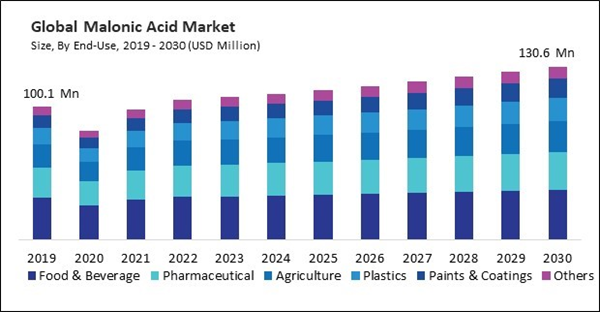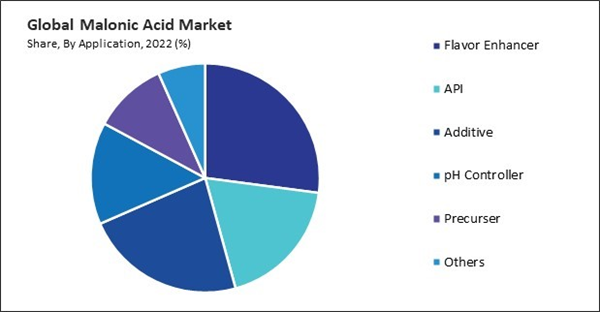Malonic acid derivatives contribute to the synthesis of plant growth regulators. Therefore, the agriculture segment acquired 17.5% revenue share in 2022. These regulators enhance or inhibit specific physiological processes in plants, promoting optimal growth and development. Certain its derivatives are used as soil conditioners in agriculture. They contribute to soil health by improving structure, water retention, and nutrient availability, leading to better crop growth.
Exploring renewable feedstocks helps reduce the industry's dependence on fossil fuels for its production. This shift contributes to mitigating the environmental impact associated with traditional chemical processes. Utilizing renewable feedstocks in its production typically results in a lower carbon footprint than processes relying on non-renewable resources.
Additionally, the ability of this to enhance the feel and spread ability of formulations makes it desirable to create cosmetic emulsions. As per the report by the National Library of Medicine updated in 2022, the ecologically based cosmetics industry is projected to reach $5.25 billion by 2029, expanding at a compound annual growth rate of 5.18% from 2019 to 2029. The global cosmetics industry is approximately third in the sector with the fastest growth rate.
However, the ongoing operational costs of running its production plant, including energy consumption, maintenance, and labor, contribute to the overall production costs. Additionally, the cost and availability of raw materials used to synthesize it can impact its economic viability. The production processes for it can be energy-intensive, contributing to higher operational costs. Energy efficiency and the environmental impact of production processes are increasingly important considerations for manufacturers and consumers. Thus, production costs and process complexity can slow down the growth of the market.
By Application Analysis
By application, the market is categorized into flavor enhancer, API, additive, pH controller, precurser, and others. In 2022, the flavor enhancer segment held 27.8% revenue share in the market. It contributes to sweetness and tartness, making it suitable for enhancing the flavor profile of a broad range of food and beverage products. Its ability to provide a balanced blend of sweet and sour notes is valuable in formulations. The flavor enhancer properties of it make it a suitable ingredient in producing soft drinks and carbonated beverages.By End Use Analysis
Based on end-use, the market is classified into food & beverage, pharmaceutical, agriculture, plastics, paints & coatings, and others. The pharmaceutical segment garnered 22.5% revenue share in the market in 2022. The chemical versatility of this makes it valuable in medicinal chemistry. It introduces specific chemical functionalities into drug molecules, influencing their pharmacological properties. Malonic acid and its derivatives are used to synthesize antiviral and antibacterial drugs.By Regional Analysis
Region-wise, the market is analysed across North America, Europe, Asia Pacific, and LAMEA. In 2022, the Asia Pacific region acquired 27.8% revenue share in the market. The Asia Pacific region has served as a pharmaceutical manufacturing and research center. Agriculture is a significant sector in many Asia Pacific countries. With the increasing population and changing consumer preferences in the Asia Pacific, there can be an increased demand for products with enhanced taste profiles.Recent Strategies Deployed in the Market
- 2023-Jun: Lonza Group Ltd. took over Synaffix, a Dutch biotechnology company. Through this acquisition, Lonza Group Ltd. would enhance its bioconjugates portfolio by incorporating the cutting-edge proprietary Synaffix technology platform and research and development capabilities, encompassing payload and site-specific linker technology.
- 2023-May: Thermo Fisher Scientific, Inc. came into partnership with the National Research and Innovation Agency, a cabinet-level government agency. Through this partnership, Thermo Fisher Scientific, Inc. would enhance Research Infrastructure and Capabilities in Indonesia.
- 2023-Apr: Lonza Group Ltd. came into partnership with ABL Bio, a South Korean biotechnology company. Through this partnership, Lonza Group Ltd. would provide comprehensive and integrated end-to-end support for the development and manufacturing of ABL Bio's bispecific antibody candidate.
- 2023-mar: Wacker Chemie AG took over ADL BioPharma, a pharmaceutical manufacturing company. Through this acquisition, Wacker Chemie AG would bolster its biotech sector, bringing us a significant stride nearer to achieving the growth objectives set for our life sciences business.
- 2023-Jan: Thermo Fisher Scientific, Inc. came into partnership with AstraZeneca Plc, an Anglo-Swedish multinational pharmaceutical and biotechnology company. Through this partnership, Thermo Fisher would create a companion diagnostic test for Tagrisso, focusing on both solid tissue and blood-based analysis.
- 2022-Oct: Thermo Fisher Scientific, Inc. took over The Binding Site Group, a medical equipment manufacturing company. Through this acquisition, Thermo Fisher Scientific, Inc. would enhance its market presence and enhance its diagnostic offerings.
List of Key Companies Profiled
- Trace Zero LLC
- Lygos Inc.
- Wuhan Amino Acid Bio-Chemical Co., Ltd
- Hefei TNJ Chemical Industry Co.,Ltd.
- Hebei jingye group
- Shandong Lixing Chemical Co. Ltd.
- Nanjing Perlove Medical Equipment Co., Ltd.
- Wacker Chemie AG
- Thermo Fisher Scientific, Inc.
- Lonza Group Ltd.
Market Report Segmentation
By Application (Volume, Tonnes, USD Million, 2019-2030)- Flavor Enhancer
- API
- Additive
- pH Controller
- Precurser
- Others
- Food & Beverage
- Pharmaceutical
- Agriculture
- Plastics
- Paints & Coatings
- Others
- North America
- US
- Canada
- Mexico
- Rest of North America
- Europe
- Germany
- UK
- France
- Russia
- Spain
- Italy
- Rest of Europe
- Asia Pacific
- China
- Japan
- India
- South Korea
- Singapore
- Malaysia
- Rest of Asia Pacific
- LAMEA
- Brazil
- Argentina
- UAE
- Saudi Arabia
- South Africa
- Nigeria
- Rest of LAMEA
Table of Contents
Companies Mentioned
- Trace Zero LLC
- Lygos Inc.
- Wuhan Amino Acid Bio-Chemical Co., Ltd
- Hefei TNJ Chemical Industry Co.,Ltd.
- Hebei jingye group
- Shandong Lixing Chemical Co. Ltd.
- Nanjing Perlove Medical Equipment Co., Ltd.
- Wacker Chemie AG
- Thermo Fisher Scientific, Inc.
- Lonza Group Ltd.










